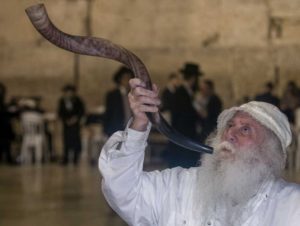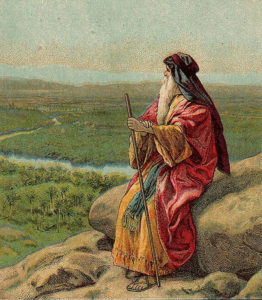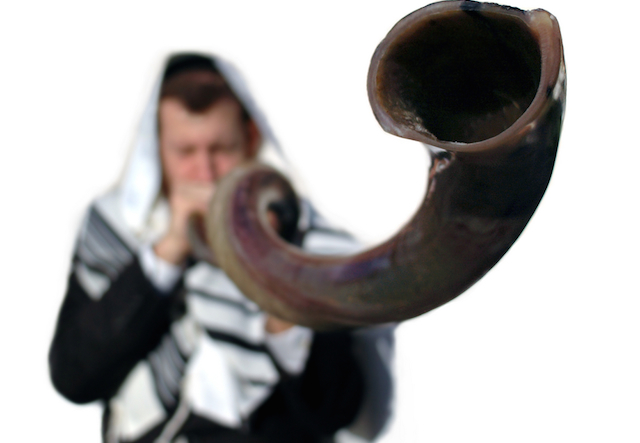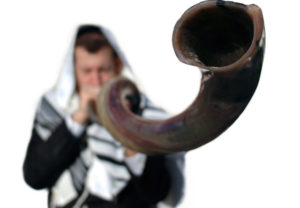Vayelech- Shabbis Shuva Combo
Can we ever overpower the yetzer horo?
After much discussion, the heylige Gemora (Rosh Hashono) concludes that we are to hear 200 or so shofar blasts over Rosh Hashono. The set we blow just before Musif is known as the ‘sitting blasts,’ those blown during the Amida, are known (by some) as the ‘standing blasts.’ Ober, just to confuse us, we stand for both sets. Why? Ver veyst! Confusion seems to be a theme of Rosh Hashono. Both the sitting and standing blasts of the shofar, are meant to somehow ‘confuse the Soton’ (the prosecuting angel), the one seeking to throw the book at us for our (less than) admirable behavior in the past year. In other words: the different sounds of the shofar, when we begin blowing (Rosh Choidesh Elul), and why we don’t bench (bless) the month of Tishrei, are all meant so somehow confuse the prosecuting angel, whose job it seemingly is, to charge us before the heavenly court which convenes over Rosh Hashono to judge us for the coming year. The Soton is also known as the Malach Hamoves (Angel of Death) and it’s our job to avoid his clutches by behaving over Rosh Hashono, begging forgiveness, and promising to do better in the coming year. It goes without saying that better behavior during the year wouldn’t hurt, ober let’s get real. In any event, says the heylige Gemora: one of the ways we confuse this Soton fellow is by masking the required shofar blasts with others sounds the shofar makes. When the Soton is confused, he somehow loses his abilities to properly and successfully prosecute. One Gemora tells us that when the Soton hears the sounds of the shofar, he comes to realize just how much the Yiddin love the RBSO and His heylige Toirah. At that point, he is left speechless and powerless. Did you chap all that? If all this rings familiar from the days your kids were playing Pokemon, it should. Ober, we may ask azoy: how is the Soton to be confused when we repeat this very routine year after year? If the shofar blasts are taka meant to confuse him, efsher we should change the order of the blowing, or, better yet, efsher we shouldn’t announce the precise times of the shofar blowing? The Soton is certainly no fool. On the other hand, efsher we can kler that what kryptonite was to Superman, the shofar sounds are to the Soton. They strip away his powers.
 The bottom line: the blasts of the shofar are meant to stir us, jar us awake from our collective stupors, and to get us into the proper mindset during the 10 days of tshuva -repentance- which began on Rosh Hashono and end with Yom Kippur. Ober, how did that work out for you? Were you moved by the sounds of the shofar? Were you sincere about your davening? Did you consider, even for a minute, let alone undertake, significant lifestyle changes? Any? How about little changes? Also not! Or, were your minds wandering? Were you constantly looking down at your watches trying to guess what time davening might be over? Were you counting the pages in your machzorim while continuously re-calculating the estimated time of Olaynu? Were you efsher thinking that the shofar blower needed to be pulled in favor of a better one? That he blew better last year; this year, not so well? That you could blow better? Were you also maybe thinking that the chazan could have done a better job? That he could have selected better tunes? That he was too slow or too fast? That his voice was better in previous years, ober this year, not as good? And when you got home, did you discuss the meaning of Rosh Hashono over lunch? Or, did you revert to your regular loshoin horo table talk? Don’t answer that! Were you just waiting for shul to be over so that you could rush home and dip the apple into some honey? Or efsher worse, your apple into someone’s else’s honey, chas v’sholom, if you chap? The emes is that change is quite difficult; we are programmed, seemingly efsher pre-programmed, to be bad. And such programming goes back generations. And the proof? The heylige Toirah!
The bottom line: the blasts of the shofar are meant to stir us, jar us awake from our collective stupors, and to get us into the proper mindset during the 10 days of tshuva -repentance- which began on Rosh Hashono and end with Yom Kippur. Ober, how did that work out for you? Were you moved by the sounds of the shofar? Were you sincere about your davening? Did you consider, even for a minute, let alone undertake, significant lifestyle changes? Any? How about little changes? Also not! Or, were your minds wandering? Were you constantly looking down at your watches trying to guess what time davening might be over? Were you counting the pages in your machzorim while continuously re-calculating the estimated time of Olaynu? Were you efsher thinking that the shofar blower needed to be pulled in favor of a better one? That he blew better last year; this year, not so well? That you could blow better? Were you also maybe thinking that the chazan could have done a better job? That he could have selected better tunes? That he was too slow or too fast? That his voice was better in previous years, ober this year, not as good? And when you got home, did you discuss the meaning of Rosh Hashono over lunch? Or, did you revert to your regular loshoin horo table talk? Don’t answer that! Were you just waiting for shul to be over so that you could rush home and dip the apple into some honey? Or efsher worse, your apple into someone’s else’s honey, chas v’sholom, if you chap? The emes is that change is quite difficult; we are programmed, seemingly efsher pre-programmed, to be bad. And such programming goes back generations. And the proof? The heylige Toirah!
 Shoin, just last week (parshas Netzovim), Moishe, on his 120th birthday mamish, gathered all the Yiddin, including those not yet born, and entered them into a new covenant with the RBSO. Why a new covenant was needed, ver veyst? Didn’t the Yiddin, those alive, and all souls not yet matched with bodies, already enter this covenant when they chanted ‘na’seh vi’nishma’ (we shall do and we shall listen) back on Har Sinai during Matan Toirah (Revelation)? They did. Ober, that all notwithstanding, that’s what Moishe did and shoin, a new covenant was entered into. The Yiddin were to be a ‘light onto the other nations’ of the world. And efsher that could taka have been the case but for a few words Moishe added as the 40 posik parsha was closing out. Moishe told those assembled that the RBSO also gave them free will and choice; they could choose good or evil, life or death. And therein taka lies the entire problem, we all know what happened next. The Yiddin haven’t fared too well with choices.
Shoin, just last week (parshas Netzovim), Moishe, on his 120th birthday mamish, gathered all the Yiddin, including those not yet born, and entered them into a new covenant with the RBSO. Why a new covenant was needed, ver veyst? Didn’t the Yiddin, those alive, and all souls not yet matched with bodies, already enter this covenant when they chanted ‘na’seh vi’nishma’ (we shall do and we shall listen) back on Har Sinai during Matan Toirah (Revelation)? They did. Ober, that all notwithstanding, that’s what Moishe did and shoin, a new covenant was entered into. The Yiddin were to be a ‘light onto the other nations’ of the world. And efsher that could taka have been the case but for a few words Moishe added as the 40 posik parsha was closing out. Moishe told those assembled that the RBSO also gave them free will and choice; they could choose good or evil, life or death. And therein taka lies the entire problem, we all know what happened next. The Yiddin haven’t fared too well with choices.
With that background, welcome to parshas Vayelech, the shortest parsha in the gantze Toirah kulo (entire heylige Toirah) where both the RBSO and Moishe predict (again) that the Yiddin will choose bad over good. They will chose to be mischievous and worse, mamish. And just before the RBSO informs Moishe that he, Moishe, is about to pass away, in three powerful pisukim, He tells Moishe that the Yiddin will in fact break the covenant (again), they will become sinners. They will abandon the RBSO in favor of avoido zoro (idolatry). How many times has the Oisvorfer told you over the past six years how much the RBSO mamish abhors avoido zoro? Lucky for most of you (us), He can deal with, and at times shows extreme patience, with those violating His other commandments. Ober, once the line is crossed, He will lash out. Lommer lernin innaveynig (let’s read the text).
| 16. And the Lord said to Moses: Behold, you are [about to] lie with your forefathers, and this nation will rise up and stray after the deities of the nations of the land, into which they are coming. And they will forsake Me and violate My covenant which I made with them. | טזוַיֹּאמֶר יְהֹוָה אֶל משֶׁה הִנְּךָ שֹׁכֵב עִם אֲבֹתֶיךָ וְקָם הָעָם הַזֶּה וְזָנָה | אַחֲרֵי | אֱלֹהֵי נֵכַר הָאָרֶץ אֲשֶׁר הוּא בָא שָׁמָּה בְּקִרְבּוֹ וַעֲזָבַנִי וְהֵפֵר אֶת בְּרִיתִי אֲשֶׁר כָּרַתִּי אִתּוֹ: | |
| 17 And My fury will rage against them on that day, and I will abandon them and hide My face from them, and they will be consumed, and many evils and troubles will befall them, and they will say on that day, ‘Is it not because our God is no longer among us, that these evils have befallen us?’ | יזוְחָרָה אַפִּי בוֹ בַיּוֹם הַהוּא וַעֲזַבְתִּים וְהִסְתַּרְתִּי פָנַי מֵהֶם וְהָיָה לֶאֱכֹל וּמְצָאֻהוּ רָעוֹת רַבּוֹת וְצָרוֹת וְאָמַר בַּיּוֹם הַהוּא הֲלֹא עַל כִּי אֵין אֱלֹהַי בְּקִרְבִּי מְצָאוּנִי הָרָעוֹת הָאֵלֶּה: | |
| 18 And I will hide My face on that day, because of all the evil they have committed, when they turned to other deities. | יחוְאָנֹכִי הַסְתֵּר אַסְתִּיר פָּנַי בַּיּוֹם הַהוּא עַל כָּל הָרָעָה אֲשֶׁר עָשָׂה כִּי פָנָה אֶל אֱלֹהִים אֲחֵרִים: |
And if that weren’t enough, a few pisukim later, just after Moishe is told how he will be put to “sleep with his forefathers,” he will present the following kal vo’choimer (a fortiori argument) to the assemblage. Said Moishe (Devorim 31: 27) azoy: “For I know your rebelliousness and your stiff neck; behold! while I am still alive with you today, you have been rebels against God- and surely after my death.” In other words: if you have the audacity to sin right before my eyes, you will avada and zicher sin after my passing! Shoin: Moishe had taka seen the results of their stiffness, if you chap. So had the Moabite shiksas. Yikes!
 And the question is azoy: given the RBSO’s predictions -correctly avada- that the Yiddin would turn to sin, and given that Moishe looked at his flock and repeated the RBSO’s message, what chances did the Yiddin ever have? And what chances do we, many generations later, have? Let’s face it: if the generation of Yiddin who were witness to open miracles became sinners -in every conceivable manner- what chances do we, in our times, have? Are we not doomed? Have we been set up to fail?
And the question is azoy: given the RBSO’s predictions -correctly avada- that the Yiddin would turn to sin, and given that Moishe looked at his flock and repeated the RBSO’s message, what chances did the Yiddin ever have? And what chances do we, many generations later, have? Let’s face it: if the generation of Yiddin who were witness to open miracles became sinners -in every conceivable manner- what chances do we, in our times, have? Are we not doomed? Have we been set up to fail?
What taka overcame them? How could they turn away from the RBSO? Ober the answer raboyseyee is quite simple: they, as are we today, were done in by their collective yetzer horos (evil inclinations) who were too damn strong and overpowering. And taka says Rabaynu Nissim on the heylige Gemora (Rosh Hashono 3a) azoy: the Soton, the very person we are trying to confuse on Rosh Hashono with shofar blasts, is none other than the yetzer horo himself. He is the enticer, the enabler, the prosecutor, and the angel of death, all rolled up into one. The RBSO gave him to each of us; he’s ours to battle daily.
And if the Yiddin of the desert generation who were not negatively influenced by fancy homes, clothing, jewelry, cars, cash, movies, sports, hot shiksas (ok- skip them), TV, and avada by the Internet still went rogue, what chances do we have in our times? Just thinking out loud. And if we do sin, is that bad? Are we at fault? Can we be blamed? Isn’t sinning and being otherwise shlecht, just what the RBSO predicted? Isn’t that the last message Moishe gave the Yiddin? Is that what He maybe expects (and gets) of us so that He can mete out punishment when we spin out of control? Ver veyst? Let’s go veyter (let’s move on).
Ober there is some good news to share. And what is it? Says the Novee Yirmiyohu (31: 30-31), azoy: “Behold days are coming, says Hashem, when I will establish with the house of Israel and with the house of Yehudah a new covenant, not like the covenant that I entered into with your fathers,……..” In other words: a new covenant is coming, seemingly a third, one day in the future, one that will not be broken. Why will that one last? Says the Ramban so gishmak, azoy: it won’t be broken because at that time, people will no longer be unduly influenced by the yetzer horo. He will cease to exist. And says the heylige Gemora (Shabbis 151b), azoy: in those days (of the new covenant) there will be no desire to sin. And which days are those? The days after the arrival of the Moshiach (Messiah). Until his arrival, the yetzer horo the RBSO gave each and every one of us, remains firmly in control. As to us mortals, the firmer we are, the less control we have, if you chap. Only the few with superhuman strength have the ability, from time to time, to successfully battle the yetzer horo and prevail. As to the rest of us, the best we can do is daven, ask forgiveness yearly and begin a new slate. Yikes!
 And on a lighter side…..when the Oisvorfer was still quite young he was taught that after the RBSO created the sun and the moon, the moon complained to the RBSO about its role in the world. The moon unabashedly asked why the RBSO needed two great lights. Shoin, the RBSO, seemingly in no mood of kvetching from His creations, responded by directing the moon to shrink itself down to size. Shrinkage is not a good thing. That story as related in the heylige Gemora and myriad medroshim always stuck with the future Oisvorfer. And its relevant this week why?
And on a lighter side…..when the Oisvorfer was still quite young he was taught that after the RBSO created the sun and the moon, the moon complained to the RBSO about its role in the world. The moon unabashedly asked why the RBSO needed two great lights. Shoin, the RBSO, seemingly in no mood of kvetching from His creations, responded by directing the moon to shrink itself down to size. Shrinkage is not a good thing. That story as related in the heylige Gemora and myriad medroshim always stuck with the future Oisvorfer. And its relevant this week why?
As mentioned above, parshas Vayelech which will be read this coming shabbis, is the shortest of all the parshas in the entire heylige Toirah. With its 30 pisukim, it’s dead last in size. Though tiny it’s far from boring. Still, efsher we can kler (ponder) that efsher Vayelech, though inanimate, had its feelings hurt. Doesn’t size matter? Why should it, the very parsha which contains mitzvahs #612 and 613, be limited to but 30 pisukim? Why was parshas Nosi gifted with 176 while Vayelech only 30? Ober can inanimate objects speak and voice their complaints? Why not? The moon did! It appears that Vayelech -maybe taka after complaining or maybe stam azoy- was instead rewarded. How so? Nu, it so happens that Vayelech is the only parsha in the gantze Toirah kula (entire Torah) that is at times read in its entirety twice in one year. And taka that’s what will happen in the Hebrew year of 5777 which began mamish just the other day with Rosh Hashono. After reading Vayelech this shabbis, also known as ‘shabbis shuva,’ in 11+ months from now, on September 16, 2017, days before Rosh Hashono, we will again be reading this parsha.
And Vayelech is controversial from the get go. The parsha begins (Devorim 31:1-2) with the words ‘Vayelech Moishe’ (and Moishe went). Immediately the rabbis began their discussions: where did Moishe go? Where taka? Shoin, we already know that the parsha takes place on Moshe’s birthday, he is set to pass away on this very day. We also established just last week that Moishe was not spending the day with his wife, kids or extended family. In fact, we were never told what became of Tzipoira or Moishe’s boys. And where was he? Let’s find out what a few had to say.
Says the Ibn Ezra azoy: Moishe went from sheyvet to sheyvet (tribe to tribe) in order to console them regarding his imminent passing. Ober says the Ohr Hachaim that the words Vayelech Moishe mean azoy: Moishe felt that his soul was getting ready to leave him, he was keenly aware that the end of his life was drawing near on this day. Says Targum Yoinoson: the words are to be read literally. Moishe went! Where did he go? He went to the Oihel Moied (the Tent Meeting Place where he regularly received direct messages from the RBSO). Ober says the Ramban: on this day Moishe left his own tent (where he resided among the other levi’im (Levites)) and visited with the other Yiddin to say his final good byes. Ober says the Seforno: Moishe didn’t go anywhere. The word Vayelech simply means that on his last day, Moishe did not sit home. Instead he went about business as usual excoriating the Yiddin to better behavior.
 So, where did Moishe go? OMG: we don’t know for sure because avada there is no consensus among the rabbis. One thing we know with certainty; on this last day of his life, he was one busy beaver. Though a ripe 120 years old, and set to die in a number of hours, he was seemingly still full of energy and vigor. On that day, besides giving his last speech, he taught the Yiddin the last two mitzvis in the heylige Toirah. He followed up by sitting down to write, as instructed by the RBSO, the entire sefer Torah which (when totally completed, so says Rashi) he then handed over to the Livi’im. And since he still had a few hours to kill, and since according to one medrish, the other shivotim complained about not receiving their own personal edition of the first ever minted sefer Toirah, Moishe sat down and wrote 12 more, for a total of 13 Torahs, all in one day. Ober how was that possible? Nu, it’s a medrish; everything is possible. Shoin, had he lived in our times, he would have been a multi-millionaire. Today’s scribes take kimat one full year, some longer, to write and complete one sefer Torah. And at $35-55,000 per Torah, Moishe would have taken in north of $500,000 for one day’s work proving once again that there is no business like Toirah business. And knowing just how Moishe was spending his last day, we can kler that Tzipoirah and the boys were likely out shopping for new camels, a dress which would not expose her privates as she mounted and dismounted, a new sheitel, black hats for the boys, and other midbar gear, ver veyst.
So, where did Moishe go? OMG: we don’t know for sure because avada there is no consensus among the rabbis. One thing we know with certainty; on this last day of his life, he was one busy beaver. Though a ripe 120 years old, and set to die in a number of hours, he was seemingly still full of energy and vigor. On that day, besides giving his last speech, he taught the Yiddin the last two mitzvis in the heylige Toirah. He followed up by sitting down to write, as instructed by the RBSO, the entire sefer Torah which (when totally completed, so says Rashi) he then handed over to the Livi’im. And since he still had a few hours to kill, and since according to one medrish, the other shivotim complained about not receiving their own personal edition of the first ever minted sefer Toirah, Moishe sat down and wrote 12 more, for a total of 13 Torahs, all in one day. Ober how was that possible? Nu, it’s a medrish; everything is possible. Shoin, had he lived in our times, he would have been a multi-millionaire. Today’s scribes take kimat one full year, some longer, to write and complete one sefer Torah. And at $35-55,000 per Torah, Moishe would have taken in north of $500,000 for one day’s work proving once again that there is no business like Toirah business. And knowing just how Moishe was spending his last day, we can kler that Tzipoirah and the boys were likely out shopping for new camels, a dress which would not expose her privates as she mounted and dismounted, a new sheitel, black hats for the boys, and other midbar gear, ver veyst.
A gittin Shabbis-
The Oisvorfer Ruv
Yitz Grossman

